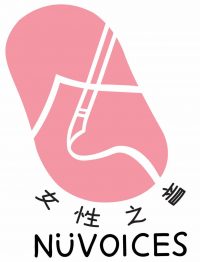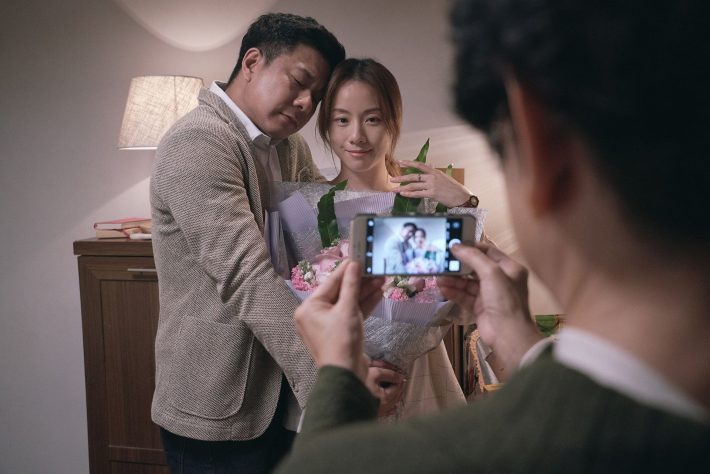BY DAISY SINGH-GREAVES
Cheung Lei-fong sits alone in a restaurant in Fuzhou, eating a bowl of noodles and looking content. Her phone starts pinging as she receives a string of panicked messages from her fiancé Edward Yan. She reaches for it – but rather than answer him, she uses it to buy a wooden table that she has saved in her browser. After doing so, she continues eating peacefully, phone still pinging away.
This is a scene from My Prince Edward, a new feature film by Hong Kong writer-director Norris Wong Yee-lam and distributed by Cheng Cheng Films. Set in Golden Plaza, a shopping mall known for wedding supplies in Hong Kong’s Prince Edward district, the film tells the story of a Hong Kong couple – Fong and Edward – falling out of love.
At the start of the film, Fong and Edward become engaged. But there’s a snag in their plans. A decade earlier, Fong entered into a sham marriage with a man from mainland China in exchange for money – a marriage that is apparently still valid. As result, Fong must find her husband and file for a divorce – all while grappling with intense social pressure.
My Prince Edward is an important realist take on female agency, independence and societal pressure in Hong Kong and shines a light on the expectations on unmarried women as well as the complexities of modern matrimony. Wong’s characterisation of Fong well captures the frustration many women feel between asserting one’s autonomy and upholding tradition. The film’s intimate settings and nuanced dialogue also allow for its main characters, though flawed, to be approached with sympathy.
Wong is a screenwriter by nature, but felt compelled to direct this piece because the script and plot were so close to her heart. In a recent interview with NüStories, Wong told us that she drew on many of her own experiences from family interactions and past relationships when creating the script and scouting for locations. “I’ve lived in Prince Edward since I was a child, so I really wanted to include its distinctive features in my first movie because there are so many interesting landmarks like Goldfish Street, Mong Kok Flower Market, Golden Plaza, the water fountains, and the recreational parks,” Wong said.
The film provides a nuanced critique of Hong Kong society that covers a smattering of issues, from the city’s crowded living spaces to its often conservative and traditional gender expectations. “Although there are many people who think that this new generation of women has the ability to pursue their own ideals or have their own careers, and they’re less constrained by societal norms, I disagree,” she said. “Whether you’re a man or a woman in this generation, society’s standards for us are deeply ingrained. You can’t free yourself. So, this movie presents this idea in one way, but it’s an eternal topic.”

Wong was not only interested in addressing the stigma of failure surrounding unmarried women, but also the issue of sham marriages and conflict between Hong Kong-born locals and mainland Chinese immigrants. Such tensions have risen to a boiling point during the recent pro-democracy protests.
“I’m interested in the topic of sham marriages because they’ve become a common occurrence for young people coming to Hong Kong from the Mainland in the past ten years,” Wong said. “For example, when I was studying for a Master’s degree at Hong Kong Baptist University, the entire class was from the Mainland. I was the only one from Hong Kong. This allowed me to get in touch with and become friends with many young filmmakers from Mainland China. You can see from this that Mainlanders coming to Hong Kong has become inevitable.”
Moving forward, Wong hopes to continue to grow as a filmmaker and craft diverse stories that can include more international perspectives. “I think personal experience nourishes your creativity, and it’s a good opportunity to get to know yourself,” she said. “(But) I also hope that I can learn as much as possible going forward, so that my films will become more diverse.”
About the author
Daisy Singh-Greaves is a British writer and copyeditor for NüStories who also helps coordinate the NüVoices London Chapter. Passionate about Chinese literature, sustainability and social equity, she has worked for non-profits and intergovernmental organisations in Beijing and Paris. She holds an undergraduate degree in Chinese and English from SOAS, and is currently undertaking a masters degree in International Relations at the University of Edinburgh. Daisy has written for Panda Radio and other China-focused media outlets, working to elevate the voices of women and minorities through grass-roots journalism. Twitter: @daisygreaves
About the editor
Jessie Lau is a journalist, editor and artist covering identity, human rights and politics—with a focus on China and other parts of Asia. Her work has been published by The Guardian, Foreign Policy, Channel 4 News, The Nation and The Economist, among others. She serves as Board Member and Online Editor-in-Chief at NüVoices, and was formerly a Hong Kong and China reporter with the South China Morning Post. Based mostly in London and Hong Kong, she holds a MSc in international history from the London School of Economics, an LLM in international studies from Peking University, and a BA in English from the University of California, Berkeley. Website: www.laujessie.com. Twitter: @_laujessie

